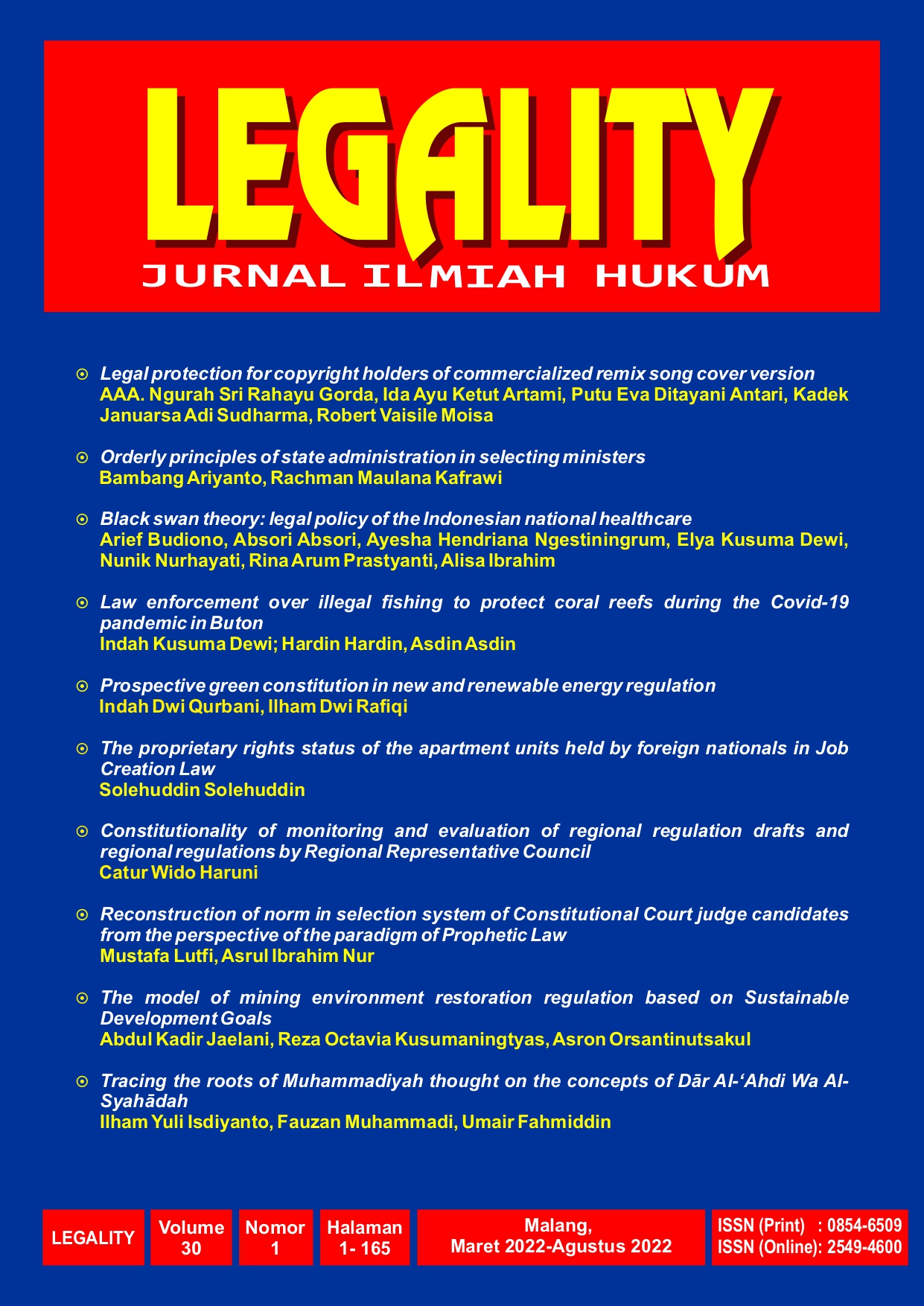Orderly principles of state administration in selecting ministers
DOI:
https://doi.org/10.22219/ljih.v30i1.15868Keywords:
Administrative Law, Presidential System, Ministerial ElectionAbstract
One of the advantages of the presidential system is the president's authority to appoint ministers without the intervention of others. The President's authority has been confirmed in Article 17 paragraph (4) of the Constitution 1945 which states that the President appoints and dismisses ministers. This regulation is also emphasized by the existence of Law Number 39 of 2008 concerning the Ministry of the State which states that ministers are assistants to the president in leading Ministry. The State Ministry Law does not set limits on how persons can be elected by the president to become ministers, whether from political parties, professionals, academics, practitioners; it is all purely the authority of the president. Limitations on ministerial candidates are only regulated in the Constitutional Court Decision Number 79/PUU-IX/2011asserting that the positions of ministers and ministries may not be sold as a political gift to a person or a group. On that basis, the question regarding what legal principles in the state administrative law can be referred to by the president in forming a competent cabinet is raised. With normative-juridical methods, the purpose of this paper is to find out the principles in state administrative law in the implementation of government, especially in cabinet elections. The results of the study show that the principle of the orderly administration of the state must serve as a reference in the implementation of government, especially in cabinet elections. This principle involves the basis of order, harmony, and balance in state control and administration. Besides, the ministers appointed by the president must avoid and be aware of the occurrence of maladministration that leads to liability personal, not job responsibilities. To strengthen the principle of orderly state administration, The Ministry of State must include this principle in one of its articles.
Downloads
References
Al-Fatih, S. (2020a). Pembentukan Norma Ambang Batas Parlemen dalam Perspektif Teori Ktiris Jurgen Habermas. Audito Comparative Law Journal (ACLJ), 1(1), 24–37. https://doi.org/10.22219/audito.v1i1.12783
Al-Fatih, S. (2020b). Penerapan Threshold dalam Pemilu Menurut Perspektif Gustav Radbruch dan Hans Kelsen. Audito Comparative Law Journal (ACLJ), 1(2), 78–84. https://doi.org/10.22219/audito.v1i2.13973
Apriani, K. D. (2019). Efek Ekor Jas dan Identifikasi Partai Politik dalam Pemilu Serentak 2019 di Bali. Jurnal Bali Membangun Bali, 2(1), 11–20. https://doi.org/10.51172/jbmb.v2i1.35
Ayuni, S. E., Sudarsono, S., & Anshari, T. (2019). Kewenangan Pemerintah Daerah dalam Pengaturan Larangan Penahanan atau Penyimpanan Dokumen Asli Pekerja oleh Pengusaha. Legality: Jurnal Ilmiah Hukum, 27(1), 115–127. https://doi.org/10.22219/ljih.v29i2.15216
Budiardjo, M. (2008). Dasar-Dasar Ilmu Politik Edisi Revisi. Jakarta: Gramedia Pustaka Utama.
Budiman, M. (2017). Kekuasaan Presiden dalam Sistem Pemerintahan Presidensil. Al-Ishlah: Jurnal Ilmiah Hukum, 20(1), 29–47. https://doi.org/10.33096/aijih.v20i1.5
Firmansyah, V. Z., & Syam, F. (2021). Penguatan Hukum Administrasi Negara Pencegah Praktik Korupsi dalam Penyelenggaraan Birokrasi di Indonesia. Integritas: Jurnal Antikorupsi, 7(2), 325–344. https://doi.org/10.32697/integritas.v7i2.817
Hamidi, J., & Lutfi, M. (2008). Paradigma Baru Lembaga Kepresidenan di Indonesia (Perspektif Teori Lembaga Negara). Jurnal Hukum Progresif, 4(1), 36–59. https://doi.org/10.14710/hp.4.1.36-59
Handayani, R. S., & Fahmi, K. (2019). Problematika Pemungutan Suara Ulang Pemilu Serentak Tahun 2019. Jurnal Hukum Media Bhakti, 3(2), 100–109. https://doi.org/10.32501/jhmb.v3i2.36
Harvelian, A., Safa’at, M. A., Widiarto, A. E., & Qurbani, I. D. (2020). Constitutional Interpretation Of Original Intent On Finding The Meaning Of Social Justice In The Constitutional Review. Yustisia Jurnal Hukum, 9(3), 348–361. https://doi.org/10.20961/yustisia.v9i3.42003
Herlindah, H. (2017). Government Role In Agricultural Management As Agrarian Resource. Hang Tuah Law Journal, 1(1), 19–37. https://doi.org/10.30649/htlj.v1i1.7
Huda, N. (2005). Hakikat Pembukaan Dalam UUD 1945. Jurnal Hukum IUS QUIA IUSTUM, 12(28), 12–25. https://doi.org/10.20885/iustum.vol12.iss28.art2
Ibad, S. (2021). Hukum Administrasi Negara dalam Upaya Penyelenggaraan Pemerintahan yang Baik. Hukmy: Jurnal Hukum, 1(1), 55–72. https://doi.org/10.35316/hukmy.2021.v1i1.55-72
Lijphart, A. (2007). Thinking about democracy: Power sharing and majority rule in theory and practice. Routledge. https://doi.org/10.4324/9780203934685
Maryanto, M. (2012). Pemberantasan Korupsi sebagai Upaya Penegakan Hukum. Civis, 2(2), 1–14. https://doi.org/10.26877/civis.v2i2/Juli.457
Maulidi, M. A. (2019). Menyoal Kekuatan Eksekutorial Putusan Final dan Mengikat Mahkamah Konstitusi. Jurnal Konstitusi, 16(2), 339–362. https://doi.org/10.31078/jk1627
Muhtadi, B. (2019). Politik Uang dan New Normal dalam Pemilu Paska-Orde Baru. Integritas: Jurnal Antikorupsi, 5(1), 55–74. https://doi.org/10.32697/integritas.v5i1.413
Nadzir, M. (2017). Government Responsibility To Protect People’s Rights Over The Clean Water. Hang Tuah Law Journal, 1(1), 38–55. https://doi.org/10.30649/htlj.v1i1.8
Rahman, A. (2019). Implications Of Political Party Recall Rights Toward Dprd Membership. Legality: Jurnal Ilmiah Hukum, 27(2), 187–195. https://doi.org/10.22219/ljih.v29i1.14991
Rini, N. S. (2018). Penyalahgunaan Kewenangan Administrasi Dalam Undang Undang Tindak Pidana Korupsi. Jurnal Penelitian Hukum, 18(2), 257–274. https://doi.org/10.30641/dejure.2018.V18.257-274
Saraswati, R. (2012). Desain Sistem Pemerintahan Presidensial yang efektif. Masalah-Masalah Hukum, 41(1), 21–31. https://doi.org/10.14710/mmh.41.1.2012.137-143
Seno, R. H. (2020). Strategi Reformasi Administrasi dan Kepemimpinan. Jurnal Reformasi Administrasi, 7(2), 113–122. https://doi.org/10.31334/reformasi.v7i2.1061
Sidqi, S. Y. N. (2008). Anomali Sistem Presidensial Indonesia (Evaluasi Praktek Politik Parlementarian). Jurnal Hukum Ius Quia Iustum, 15(1), 32–59. https://doi.org/10.20885/iustum.vol15.iss1.art4
Sonata, D. L. (2015). Metode Penelitian Hukum Normatif dan Empiris: Karakteristik Khas dari Metode Meneliti Hukum. FIAT JUSTISIA:Jurnal Ilmu Hukum, 8(1). https://doi.org/10.25041/fiatjustisia.v8no1.283
Susanto, S. N. H. (2019). Good Governance dalam Konteks Hukum Administrasi. Administrative Law & Governance (ALGJ), 2(2), 206–217. https://doi.org/10.14710/alj.v2i2.205-217
Umami, R., Haruni, C. W., & Esfandiari, F. (2021). Tingkat Partisipasi Politik Masyarakat dalam Pilkades Serentak Tahun 2019. Indonesia Law Reform Journal (ILREJ), 1(1), 143–152. https://doi.org/10.22219/ilrej.v1i1.16123
Wrage, S. D. (1998). The Perils of Presidentialism Reconsidered. Mershon International Studies Review, 42(2), 380–382. https://doi.org/10.2307/254438
Wulandari, T., & Zulkifli, Z. (2017). Mekanisme Kinerja Lembaga Ombudsman RI Perwakilan Provinsi Riau (Mekanisme Penanganan Laporan Masyarakat di Kota Pekanbaru). Publika: Jurnal Ilmu Administrasi Publik, 3(2), 184–206. https://doi.org/10.25299/jiap.2017.vol3(2).3568
Yani, A. (2018). Sistem pemerintahan Indonesia: Pendekatan Teori dan Praktek Konstitusi Undang-Undang Dasar 1945. Jurnal Legislasi Indonesia, 15(2), 55–68. https://doi.org/10.54629/jli.v15i2.187
Downloads
Published
How to Cite
Issue
Section
License
Copyright (c) 2022 Bambang Ariyanto, Rachman Maulana Kafrawi

This work is licensed under a Creative Commons Attribution-ShareAlike 4.0 International License.










